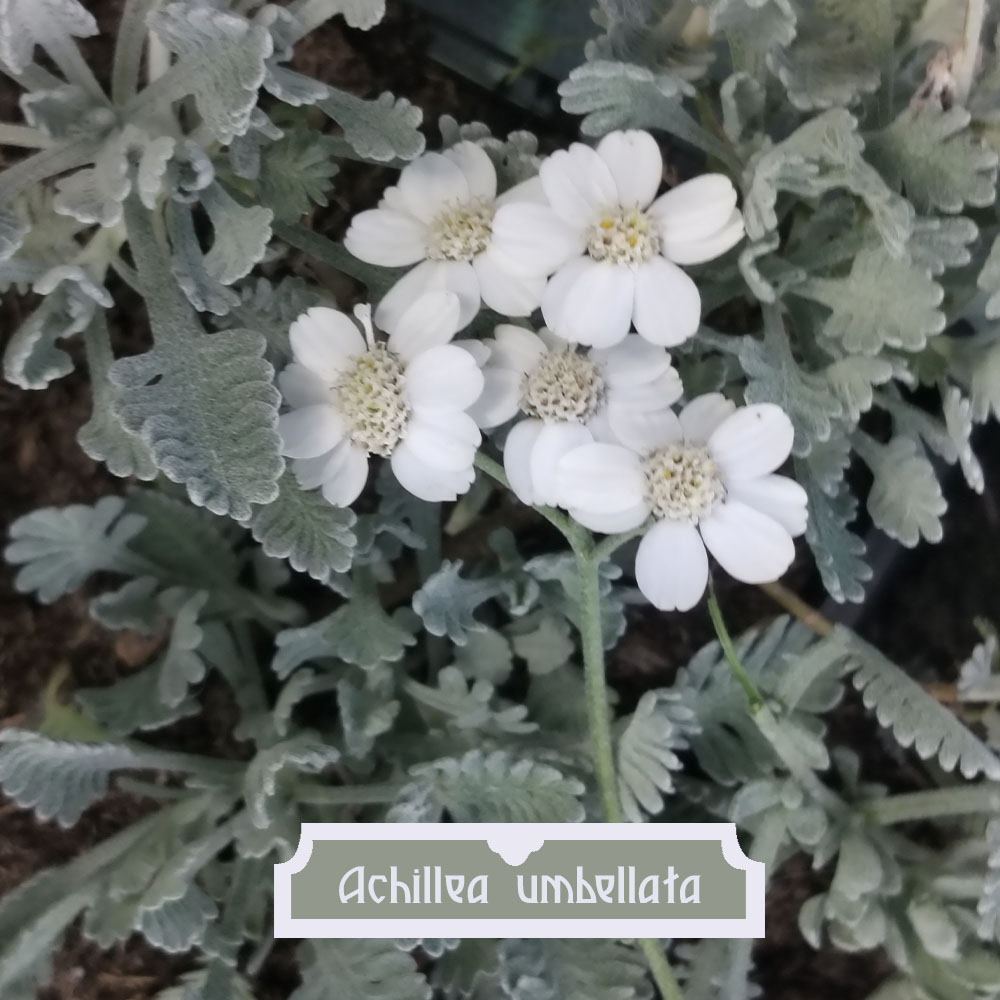No products in the cart.
Achillea umbellata
Soft grey ground cover with small white flowers.
Rated 0 out of 5
0 customer reviews
6,00 € – 14,00 €Price range: 6,00 € through 14,00 €
Tags: chaud, graphique, perennial, plant, potted plant, secheresse, soleil, vivace, vivace en pot, xeriscaping
SKU: pda700
Category: Balcony-Friendly, Bouquet, Evergreen, Frost Hardy, Grey Ladies, Ground Cover, Rewild

Achillea umbellata
6,00 € – 14,00 €Price range: 6,00 € through 14,00 €
Achillea umbellata is a small fluffy perennial plant that grows close to the ground, forming silver cushions of finely divided leaves – as soft on the eyes as they are soft to the touch.
Its finely toothed, downy foliage, a brilliant silvery gray in winter, becomes almost white in summer under the influence of heat and drought. It reminds us of Tanacetum densum subsp amani in a lot of ways.
The flowers are pure white, flat topped umbels – the typical Achillea flower shapes – appearing in the spring, between April and June.
The foliage is evergreen, allowing for interest in the winter as well.
Achillea umbellata forms a valuable-looking ground cover, 15–25 cm tall in flower and 10–15 cm for the foliage, depending on growing conditions.
All yarrows love the sun and are highly hardy.
Non-invasive, hardy, soil-undemanding, and water-efficient, it is ideal for dry, arid slopes. This yarrow also helps suppress weeds and adds a refined touch to the garden.
👨🌾GARDENING TIPS👨🌾:
-
- ☀️Prefers full sun and dry, well-drained soil.
- 💧Applying mulch around the clump will help retain moisture for a longer period.
- ✂️ Cutting back the stems to 20cm from the ground in January promotes a strong reconstitution
- ➗Divide the clumps as they begin to multiply. It isn’t invasive, but can be a vigorous grower.
Discover how to garden with Achillea umbellata:
-
- Inspiration: Jardin Sec: Mediterranean Style Gardening
- Cushions: Combine with cushion plants such as Geranium sanguineum, Erigeron karvinskianus, Nepeta x faassenii or other yarrows (Achillea millefolium).
- Ground covers: Combine with mat-forming perennials such as various Thymus species, Origanum or Rosmarinus prostratus
The Tales & The Botany: Achillea umbellata
Like its relatives in the Achillea genus, Achillea umbellata has been celebrated for centuries for its herbal properties, though in the garden it’s mostly prized for its airy white flowers, delicate foliage, and pollinator-friendly charm.
This excellent rock garden perennial requires little weeding thanks to its allelopathic properties*
Allelopathy, as our Thyme friends will remind us, is the ability of certain plants to synthesize compounds in their roots that inhibits the germination and growth of other seeds – assuring total dominance of a species once it becomes large enough.
The genus name Achillea pays homage to the legendary Greek hero Achilles, who, according to folklore, used plants of this genus to treat soldiers’ wounds.
The species epithet umbellata refers to the characteristic flat-topped, umbrella-like clusters of tiny flowers that appear in late spring, giving the plant its airy, textured appeal.
🌸 Floral Morphology
The flowers of Achillea umbellata form flat-topped umbels, creating a delicate cloud of white at the top of short, erect stems.
Each tiny flower is actinomorphic, with five fused petals, and collectively they attract a wide range of pollinators, from bees and hoverflies to small butterflies.
The leaves are alternate, finely dissected, and feathery, giving a soft, lacy texture that contrasts beautifully with coarser-leaved companions.
When touched, the foliage emits a slight herbal aroma, hinting at its traditional medicinal uses and adding sensory interest to the garden.
🌱 Reproductive Biology
Achillea umbellata is hermaphroditic, capable of self-pollination but thriving with cross-pollination by insects.
Fruits are small, dry achenes, which can self-seed under ideal conditions, helping the plant naturalize in sunny, well-drained areas.
Flowering occurs from late spring into early summer, and deadheading can prolong bloom slightly.
The airy floral structure and aromatic foliage make it particularly attractive to pollinators, supporting garden biodiversity while providing a delicate visual display.
🌍 Écologie & Adaptations
Achillea umbellata thrives in temperate and Mediterranean-style gardens, particularly in:
-
- Rockeries and alpine gardens: Forms compact mats that stabilize soil on slopes and create airy, delicate white floral displays.
- Pollinator-friendly borders: Flowers provide nectar for bees, butterflies, and hoverflies, supporting garden biodiversity.
- Sun-exposed sites: Full sun encourages prolific flowering and keeps foliage compact, while the plant tolerates poor, well-drained soils.
Key adaptations include:
-
-
High drought tolerance once established: Finely divided, feathery leaves minimize water loss and help the plant survive dry periods.
-
Sun-loving: Performs best in full sun, though light shade is tolerated.
-
Low-maintenance: Resilient foliage and compact habit require minimal care.
-
Long flowering period: Umbels bloom from late spring into early summer, providing continuous nectar and visual interest.
-
Self-supporting, mat-forming habit: Ideal for front-of-border planting, rockeries, or container use.
-
Fun fact: Like other members of the Achillea genus, Achillea umbellata has a long history of medicinal use, but in modern gardens it is mostly celebrated for its airy white flowers, lacy foliage, and pollinator-friendly charm.
Other names:
Umbellate Yarrow
Origin:
Greece
| Weight | 0,5 kg |
|---|---|
| Container Size | 9×9 cm, 2L |
| Flower Color | ⚪ White |
| Flowering | April, May, June |
| Soil | Dry, Well-Draining |
| Exposure | Full Sun |
| Frost Tolerance | -15°C to -20°C |
| Size | 0.3m H x 0.5m W |
Reviews
0
Rated 0 out of 5
0 customer reviews
5
0
4
0
3
0
2
0
1
0
Only logged in customers who have purchased this product may leave a review.
You may also like…
Thymus longicaulis ‘Odoratus’
A fast-growing ground cover with strongly aromatic leaves, and bright pink flowers in early summer.
A fast-growing ground cover with strongly aromatic leaves, and bright pink flowers in early summer.
Rated 0 out of 5
Achillea ptarmica Boule de Neige
White pompom flowers to attract bees to your garden all summer long.
White pompom flowers to attract bees to your garden all summer long.
Rated 0 out of 5
Nepeta x faassenii Six Hill’s Giant
Catnip is known for its grey-green, aromatic foliage and masses of lavender blue flowers.
Catnip is known for its grey-green, aromatic foliage and masses of lavender blue flowers.
Rated 0 out of 5
Thymus ‘Duftkissen’
An intensely fragrant and profusely flowering thyme with grey-green, soft leaves.
An intensely fragrant and profusely flowering thyme with grey-green, soft leaves.
Rated 0 out of 5
Related Products
Tanacetum densum subsp amani
A shrublet composed of soft, finely divided silvery gray-white leaves.
A shrublet composed of soft, finely divided silvery gray-white leaves.
Rated 0 out of 5
Delosperma cooperi
A dwarf perennial known for its vermillion colored flowers
A dwarf perennial known for its vermillion colored flowers
Rated 0 out of 5
Tradescantia Blushing Bride
Gorgeous blushes of pink and white that appear in the coldest nights.
Gorgeous blushes of pink and white that appear in the coldest nights.
Rated 0 out of 5
Kalanchoe daigremontiana
A toothy succulent from Madagascar, known as the Mother of Thousands.
A toothy succulent from Madagascar, known as the Mother of Thousands.
Rated 0 out of 5
Sedum album
A low, multi-color ground cover.
A low, multi-color ground cover.
Rated 0 out of 5
Vinca minor
Looping elegance and ability to form a low flowering ground cover
Looping elegance and ability to form a low flowering ground cover
Rated 0 out of 5
Cerastium tomentosum var. columnae
A grey-green spreading ground cover from the mountains.
A grey-green spreading ground cover from the mountains.
Rated 0 out of 5
Euphorbia myrsinites
Known for its draping form of silver-gray foliage and radiant blooms.
Known for its draping form of silver-gray foliage and radiant blooms.
Rated 0 out of 5
Hellebore argutifolius
Winter flowering perennial with marbled blue-green leaves
Winter flowering perennial with marbled blue-green leaves
Rated 0 out of 5
Glechoma hederacea
A sweet smelling ground cover, producing little blue flowers all summer long.
A sweet smelling ground cover, producing little blue flowers all summer long.
Rated 0 out of 5
Hieracium maculatum Leopard
A native perennial with blue-green leaves and a tall yellow flower
A native perennial with blue-green leaves and a tall yellow flower
Rated 0 out of 5
Melissa officinalis
A perennial plant in the mint family that is adored by bees, royal families and tea drinkers.
A perennial plant in the mint family that is adored by bees, royal families and tea drinkers.
Rated 0 out of 5
Artemisia Valerie Finnis
A semi-evergreen, aromatic variation on the theme of Artemisia.
A semi-evergreen, aromatic variation on the theme of Artemisia.
Rated 0 out of 5
Mentha x piperita ‘Chartreuse’
A spicy mint, known for its use in the production of liqueurs and herbal teas.
A spicy mint, known for its use in the production of liqueurs and herbal teas.
Rated 0 out of 5
Echinacea purpurea
A perennial with purple flowers all summer long
A perennial with purple flowers all summer long
Rated 0 out of 5
Stachys byzantina
Silky white-grey leaves and tall striking flowers
Silky white-grey leaves and tall striking flowers
Rated 0 out of 5
Erigeron kavinskianus
A daisy-like carpet of flowers
A daisy-like carpet of flowers
Rated 0 out of 5
Euphorbia cyparissias Clarice Howard
A Euphorbia that resembles a soft little cyprus tree
A Euphorbia that resembles a soft little cyprus tree
Rated 0 out of 5
recent view product
Koeleria glauca Blue Sprite
An ornamental, low growing blue grass
An ornamental, low growing blue grass
Rated 0 out of 5
Salvia microphylla ‘Hot Lips’
Fragrant, hardy and drought tolerant with a bright and abundant flowering season.
Fragrant, hardy and drought tolerant with a bright and abundant flowering season.
Rated 0 out of 5
Aquilegia vulgaris Leprechaun Gold
A light for dark corners – marbled with gold foliage.
A light for dark corners – marbled with gold foliage.
Rated 0 out of 5
Nepeta clarkei
Catnip from the mountains of Pakistan and India
Catnip from the mountains of Pakistan and India
Rated 0 out of 5
Lupin Russell Hybrids Mix
Extraordinary colors range of flowers on tall spires
Extraordinary colors range of flowers on tall spires
Rated 0 out of 5


















































There are no reviews yet.